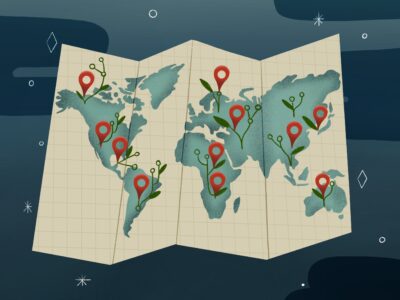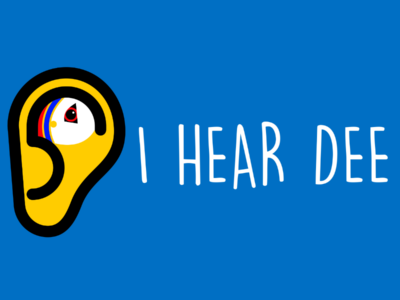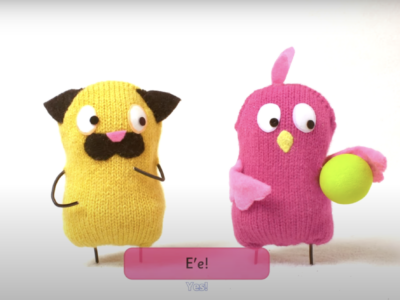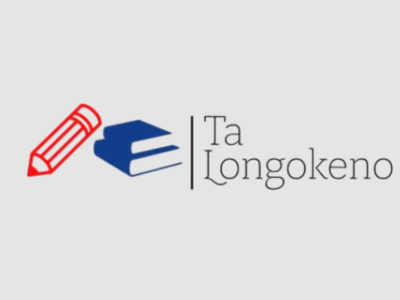Search directory:
Are you or your community leveraging the Internet, digital media or other technologies to promote your Indigenous, endangered, or low-resource language in digital spaces?
If you answered “yes,” Rising Voices invites you to add your project to this digital directory as a way to share your knowledge and experiences with other communities.
Adding your project to the directory can help 🌞 inspire other communities and 🔎 increase the visibility of your important work.
We also hope that the directory can help 🔗 connect like-minded people who work with the same language, who live in the same country, who use similar tools or simply want to learn more about digital initiatives.
Directory
Add your project to the directory of digital language projects
Stories about Directory
I Hear Dee
The "I Hear Dee" project, led by a linguist and native speakers, documents and promotes Shaetlan, an endangered mixed language in Shetland, across several digital platforms.
Talking Planet Mi'kmaw
Animated series available on YouTube that follows the adventures of Mimi, Pip and Momo, designed for young language learners of the Mi'kmaw language of Nova Scotia, Canada.
Talongokeno
Talongokeno is a blog focusing on Kikongo-Tsilaadi and Kikongo-Civili, aiming to provide a rare spotlight on their grammar, vocabulary, and conjugation for diaspora and local readers on social media.
BASAsulsel Wiki
BASAsulsel Wiki, part of the BASAibu Wiki network, serves South Sulawesi, Indonesia, promoting the Buginese and Makassaresel languages and community engagement. It empowers users to shape content and discuss civic issues.
Luh Ayu Manik Mas
The Luh Ayu Manik Mas project, featuring a Balinese cartoon superhero from Indonesia, promoting environmental awareness and the Balinese language through a crowd-sourced storytelling and tri-lingual book production.
Sakiraaɓe Media
Created by young undergraduates from Bayero University, Kano, Nigeria, the project is dedicated to preserving Fulfulde through creative media and social platforms, fostering awareness and language sustainability.
MICEC TikTok
The Manitoba Indigenous Cultural Education Centre (MICEC) utilized TikTok during the pandemic to connect with their community, sharing cultural content in the Indigenous languages of Nēhinawēwin (Swampy Cree) and Anishinaabemowin (Ojibwe).
BASAbali Wiki
The initiative BASABali encourages local civic participation by youth and the use of the Balinese language of Indonesia via a community platform with a dictionary, word games, and community spaces.
Brezhoweb
Brezhoweb, an online Breton TV channel since 2006, offers diverse, quality content, collaborates, and uses numerous social media platforms to promote the Breton language spoken in Brittany, France.
Bien Chabacano
The blog Bien Chabacano delves into the history of the Chabacano language spoken in the Philippines and aims to revitalize it among younger speakers. Herrera also translated "Le Petit Prince" into Chabacano in 2018.
Storyweaver in Bikol
Read, translate or remix freely licensed children's books into the Bikol (Central) language of the Philippines through the open-source StoryWeaver digital platform that offers tools for translation and storybook creation.
Angika Wikipedia
After a decade in incubation, the Angika-language Wikipedia merged as a full site on March 22, 2023. Despite challenges, it now offers over 1600 articles, providing Angika speakers access to diverse knowledge, including local customs.
Shagz Chronicles
A Kikuyu-language podcast project revisits the 1990s, exploring rural Kenyan childhood memories, aiming to revive appreciation for Kikuyu language and culture, especially among the diaspora.
Ghanaian Pidgin Wikipedia
Starting in 2021, a project aimed to create a Ghanaian Pidgin Wikipedia. By 2023, the volunteer-driven initiative powered by the Ghanaian Pidgin Wikimedians Community launched gpe.wikipedia.org, recognized by the Wikimedia Foundation.
Speak Ekpeye Fluently
The Speak Ekpeye Fluently initiative uses digital platforms to preserve and promote the Ekpeye language through teaching, documentation, virtual tutorials, dialect harmonization, resources, curriculum development, and cultural forums.

















